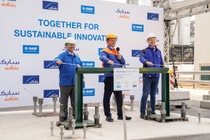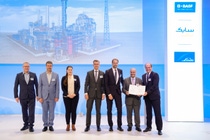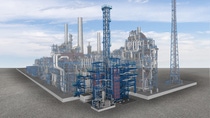Petrochemicals
Joint News Release
BASF, SABIC and Linde start construction of the world’s first demonstration plant for large-scale electrically heated steam cracker furnaces
- Demonstration plant with 6 megawatts input of renewable electrical energy to be fully integrated into a steam cracker at BASF’s Ludwigshafen Verbund site
- Technology has the potential to reduce CO2 emissions by at least 90% compared to conventional steam crackers
- Project has been awarded funding by the German Federal Ministry for Economic Affairs and Climate Action
- Start-up of the demonstration plant is targeted for 2023
September 1, 2022 – BASF, SABIC and Linde have started construction of the world’s first demonstration plant for large-scale electrically heated steam cracker furnaces. By using electricity from renewable sources instead of natural gas, the new technology has the potential to reduce CO2 emissions of one of the most energy-intensive production processes in the chemical industry by at least 90% compared to technologies commonly used today.
The demonstration plant will be fully integrated into one of the existing steam crackers at BASF’s Verbund site in Ludwigshafen, Germany. It will test two different heating concepts, processing around 4 tons of hydrocarbon per hour and consuming 6 megawatts of renewable energy. The start-up of the demonstration plant is targeted for 2023.
BASF and SABIC are investing together into the project and the demonstration plant will be operated by BASF. Linde is the engineering, procurement and construction partner for the project and in the future will commercialize the developed technologies.
To support the development of the novel furnace technology, the project has been granted €14.8 million by the German Federal Ministry for Economic Affairs and Climate Action under its “Decarbonization in Industry” funding program. The program is supporting energy-intensive industries in Germany in their efforts to achieve carbon neutrality.
“BASF’s mission is to achieve climate neutrality, and electrification of the hugely energy-intense steam cracker is a significant milestone in our transformation journey towards net zero,” said Dr. Martin Brudermüller, Chairman of the Board of Executive Directors of BASF SE. “We are proud that BASF has been granted project funding by the German Federal Ministry for Economic Affairs and Climate Action, as it is a testament to the support of our approach also by policymakers.”
Yousef Al-Benyan, Vice-Chairman and CEO of SABIC said: “Our vision is to transform our business and to help address urgent global challenges through efficient carbon management. This project holds huge potential for all of the petrochemical industry around the world in our drive for low carbon emitting processes. With the milestone we are jointly announcing today on the start of construction, we hope that our three-party collaboration can inspire many more collaborations that ultimately bring the world to net-zero greenhouse-gas emissions through a circular carbon economy.”
“This project demonstrates how global companies can successfully collaborate by combining their expertise in technology development, engineering, procurement and construction execution and operation. The timely delivery of the demonstration plant will be a major milestone on the path to making sustainable solutions available to the petrochemical industry. We are proud to be part of this breakthrough project,” said Jürgen Nowicki, Executive Vice President Linde plc and CEO of Linde Engineering.
The demonstration plant aims to show that continuous olefin production is possible using electricity as a heat source. The plant is designed in a way that two heating concepts can be tested in parallel: Direct heating applies an electric current directly to the process tubes inside the reactor; indirect heating uses radiative heat of heating elements placed around the tubes. Testing these two concepts will make it possible to react flexibly to different customer and site requirements.
Steam crackers play a central role in the production of basic chemicals and require a significant amount of energy to break down hydrocarbons into olefins and aromatics. Typically, the reaction is conducted in furnaces at temperatures of about 850 degrees Celsius. Today these temperatures are reached by burning fossil fuels. The project aims to reduce the CO2 emissions by powering the process with electricity.
About BASF
At BASF, we create chemistry for a sustainable future. We combine economic success with environmental protection and social responsibility. Around 111,000 employees in the BASF Group contribute to the success of our customers in nearly all sectors and almost every country in the world. Our portfolio comprises six segments: Chemicals, Materials, Industrial Solutions, Surface Technologies, Nutrition & Care and Agricultural Solutions. BASF generated sales of €78.6 billion in 2021. BASF shares are traded on the stock exchange in Frankfurt (BAS) and as American Depositary Receipts (BASFY) in the U.S. Further information at www.basf.com.
About SABIC
SABIC is a global diversified chemicals company, headquartered in Riyadh, Saudi Arabia. It manufactures on a global scale in the Americas, Europe, Middle East and Asia Pacific, making distinctly different kinds of products: chemicals, commodity and high performance plastics, agri-nutrients and metals. SABIC supports its customers by identifying and developing opportunities in key end-use applications such as construction, medical devices, packaging, agri-nutrients, electrical and electronics, transportation and clean energy. SABIC recorded a net profit of SR 23 billion (US$ 6.15 billion) in 2021. Sales revenues for 2021 totaled SR 174 billion (US$ 46.6 billion). Total assets stood at SR 318 billion (US$ 84.9 billion) at the end of 2021. Production in 2021 stood at 58 million metric tons. The company has more than 31,000 employees worldwide and operates in around 50 countries. Fostering innovation and a spirit of ingenuity, SABIC has 10,090 patents and pending applications, and has significant research resources with innovation hubs in five key geographies – USA, Europe, Middle East, South Asia and North Asia.
Visit www.sabic.com for more information.
About Linde
Linde is a leading global industrial gases and engineering company with 2021 sales of $31 billion (€26 billion). We live our mission of making our world more productive every day by providing high-quality solutions, technologies and services which are making our customers more successful and helping to sustain and protect our planet. The company serves a variety of end markets including chemicals & energy, food & beverage, electronics, healthcare, manufacturing, metals and mining. Linde's industrial gases are used in countless applications, from life-saving oxygen for hospitals to high-purity & specialty gases for electronics manufacturing, hydrogen for clean fuels and much more. Linde also delivers state-of-the-art gas processing solutions to support customer expansion, efficiency improvements and emissions reductions.
For more information about the company and its products and services, please visit www.linde.com.
Media contacts:
|
BASF Corporate Media Relations |
SABIC Media Relations |
| Thomas Nonnast | Lindsay Clarkmead |
| Phone: +49 173 379 8627 | Phone: +34 648 246 318 |
|
Email: thomas.nonnast@basf.com Linde Engineering Marketing & Communications Elitsa Kateva Phone: +49 173 420 4003 |
Email: lindsay.clarkmead@sabic.com SABIC Media Relations (Germany) Michaela Stamm Phone: +49 (0)172 2496 072 Email: michaela.stamm@SABIC.com
|
P-22-326




